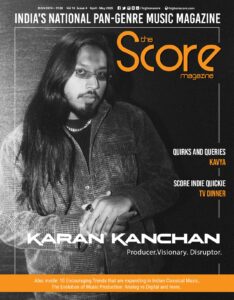Indian Classical Music is heavily dependent not just on the external layer of plain devotion towards the supreme power. It goes beyond the bhakti yoga and gets into spirituality, by showing that God is eventually within us and the inquisitive nature of soul search is always present. Composers like Annamayya who predominantly wrote keertanams in praise of Lord Venkateshwara also embraced this order of “tatvam” which simply questions the journey of a soul. The fleeting aspect of a thought, desire, and running behind materialistic things is greatly questioned in such compositions. One of the most brilliant examples of Annamayya’s tatva keerthanam is Naanati Bratuku Naatakamu – which says that the entire life is just a drama with characters in it! Muttuswami Dikshitar prayed Goddess Lalitha in the majestic kriti Hiranmayeem Lakshmeem when he was coaxed by his wife to earn materialistic possessions than just plain worship.
But there is perhaps no other composer like Saint Thyagaraja who explored tatvam along with praise of Lord Rama in simple Telugu with easily understandable terms. It is not the complexity that is more challenging, but simplifying a subject like Spirituality is. He holds the entire credit for bringing spirituality to a common listener with some amazing compositions. Usually, Thyagaraja is associated with his eternal bhakti towards Lord Rama, which cannot be obviously questioned. On the eve of Saint Thyagaraja Aaradhana Season, we take a dig at his compositions which have an additional layer of spiritual science.
If we take the example of popular pancharatna kriti Dudukugala Nanne Dora, the charanams are full of self-analysis and how mankind is stuck in the race for money and power. For example,
Maanavathanu durlabha manuchu nemchi paramaananda monda leka
mada mathsara kaama lobha mohula kuDaasudai – mosa bothi gaaka
Speaks about the illusory nature of life and how the imaginary aspects of life drive us in an unnecessary drama of it. Saint Thyagaraja also made sure that a meditative power of keeping heart and mind in control is necessary – apart from blind worship towards God. Some of the kritis which convey the same are:
- Manasa Yetulorthune – Malayamarutham
- Chakkani Raja Margamu – Kharaharapriya
- Gnanamosagaraada – Poorvi Kalyani
- Swara Raaga Sudha Rasa – Shankarabharanam
- Sugunamule Cheppukonti – Chakravakam
- Nidhi Chaala Sukhama – Kalyani
- Manasuloni Marmamunu – Hindolam
- Durmaargacharaadhamula – Ranjani
- Dwaitamu Sukhama Advaitamu Sukhama – Reetigowla
- Tatvameruga Taramaa – Garudadhwani
All these aforementioned kritis speak elaborately about the fleeting nature of life and suggest not to develop too many attachments on low level aspects of it. In fact, some of them also mention about the sublime surrender towards the supreme being to get enough strength to maintain the spiritual balance. Every school of meditation around the world aims at silencing the confused state of mind and what better way is there than Saint Thyagaraja’s compositions to realize this fact!








